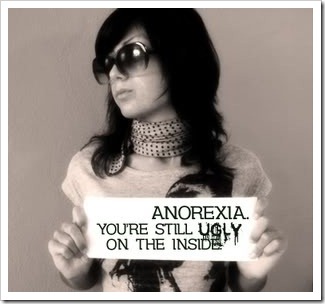
If you have anorexia or any other eating disorder, or if you have a child that has it and you want to help, it is important to focus on the thoughts and the mindset and not on the food. Not eating is not the problem. It is the solution that people with a distorted perception find for their problems.
Avoid trying to convince them to eat. It only makes things worse. Anorexic people need control, not a nagger.
Avoid punishing a child who has anorexia. It only increases their helplessness and their desire to control something (ANYTHING) in their life, like what they eat, when they eat and how much they eat.
Generally, anorexic people have a very bad self-image, considering self as useless, not worthy, a failure, stupid, an idiot, etc, and they use every little thing that happens in their life to reinforce it. They use their glasses to look for proof they are worthless and they do not consider single events as temporary or coincidental, but as part of their identity.
Here is a list of thoughts that make big things out of small things and demonstrates the effect of the huge magnifying glasses anorexic people wear. Each one you get rid of will reduce the magnifying effect.

- Every tiny mistake is proof they are useless, stupid and failures. Anorexic people do not see that mistakes happen because they are tired, because they do not know something or just because they are human. Even the tiniest mistakes should never happen!
- Thinking “I feel ugly, so I must be ugly”. This is when someone is convinced that the feeling defines them. Again, this is a problem with magnifying the feeling and not considering the feeling as temporary.
- Seeking approval from others, because “I’m not in control and I’m useless”. This attitude is problematic because the source of anorexia is lack of control. Anorexics live in a continuous attempt to prove that they are not in control and that they are useless, so during hard times, they will seek approval (disapproval) from others to support these notions.
- Thinking “I am not enough” – not good enough, not smart enough, not friendly enough, etc. Many times, they hear those statements from others and after a while, they start adopting the belief. If you are a parent, watch what you say and make sure your love for your children is unconditional. They are born good enough and do not have to prove they are good enough, smart enough or considerate enough for you to love them. Keep in mind you do not have to use the word “enough” to state that you do not think they are “enough”. If you compare them to someone else, if you tell them they need to earn your trust or love, if you criticize them, if you are sarcastic towards them, if you are aggressive towards them, if you are judgmental or if you are controlling, then you are telling them they are not “enough”.

- Excessive use of the word “should” to set unrealistically high standard and make sure there will fail. Again, if you are a parent, watch what you say. Many of the people who use the word “should” grew up in homes that used this word too often.
- Excessive use of the word “must”. This limits the choices and supports the feeling of helplessness. Similar to “should”, many anorexic people have heard they “must” do, be or have things so many times that they are convinced it is true. If you are a parent, I suggest you only tell your children they must be, i.e. they must stay alive. The rest is their choice. Otherwise, they might choose not to eat and then, they might not be.
- Black and white thinking. This is the brother of “must” and “should” and supports the magnifying effect. If I feel sad, I am 100% sad, nothing in the middle. If I feel angry, I am 100% angry. Those people have a problem with rating their feelings (good and bad). If you ask them to rate their emotions from 1-10, the answer will always be “10”.
- Tendency towards perfectionism – keeping high standards to regain control and reassure there will always be disappointment and failure.

- Believe that rules of the rest of the world do not apply to them. They use this strategy to reject help and to justify their existing situation. They say, “What do you know?” and if you do understand, they say, “Yes, but your case was different from mine”.
It is important to know that anorexic people are not born with those magnifying glasses. They develop them due to lots of pain and an inability to manage their emotions. Therefore, the power of their glasses can be changed with love, creativity and strong emotional intelligence.
Be happy!
Ronit
This post is part of the series Anorexia:
No posts found











